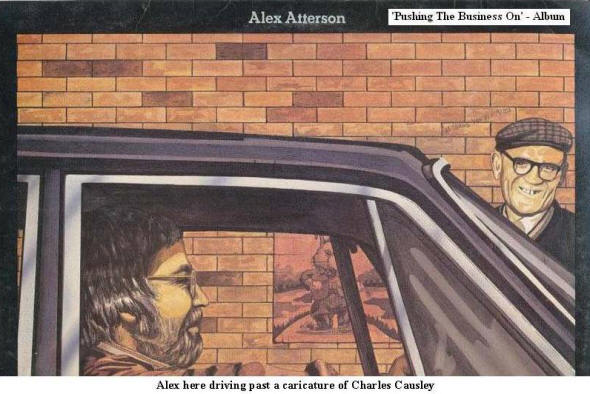|
Alex Atterson B.Sc.
Pianist, Folk Singer and Teacher of Science
"A Celebrated Son of the Rock"
John writes.
"Having been out of touch to
any large extent with folk in Cambusbarron for a number of years, I was
saddened when, just yesterday, a former pupil of mine, Peter Paterson from
the village, told me of his death in 1996. In our e-mail conversations. I
had happened to say, 'Alex Atterson was one of my boyhood heroes in the
village around 1950 .... mainly due to his piano playing virtuosity. I
wonder where he is now (if alive); he went to St Andrews University; and I
loved his mum. Mrs Atterson. and her baking!'
Peter provided me with
photographs and snippets of data about Alex's subsequent life, and I
followed these up on-line via 'Google' .... thus .... "
Alex Atterson
Bom in Cambusbarron, Stirling on the 14th of April. 1931
Died in Norwich. Norfolk on the 21st of September. 1996

Obituary : Alex Atterson
by KARL DALLAS for THE INDEPENDENT newspaper
on Thursday. 13 November. 1996
Alex Atterson ( b.
Camhuvburroti. Stirling 14 April, 1931 - at Norwich, Norfolk, 21 September,
1996 ): married (two sons)
"Every movement has its
generals and foot-soldiers, and in the ranks of the folk revival Alex
Atterson was probably more of an NCO. Though by no means one of its
best-known singers, he was a robust performer of the Scottish canon and his
settings of the poems of Charles Causley arc comparable with - and probably
superior to - those of Paul Simon.
Alex was born in Cambusbarron,
a small village a mile south-west of Stirling, into an extended family that
used to hire the village hall every New Year's Day for an impromptu party in
which every member had their party piece, which might be contemporary pop or
traditional Scots. He was the only child of a woman who had served as a
nanny to the local gentry; his father was a semi-skilled worker with a
variety of trades to his name.
He trained as an industrial
chemist, coming south to work with the British Sugar Corporation in
Peterborough, then moving to the Reckitt and Colman company in Norwich, a
city where he stayed until he died. Singing regularly at the local Sunday
night folk club, he became a professional performer in the late Sixties -
about the same time that he became deeply involved in the Norwich Folk
Festival, one of the most widely respected events in the folk calendar for
13 years until, in 1982, it was barred from the campus of the University of
East Anglia because the authorities were afraid that travellers from the
then notorious "Convoy" might sneak in and establish a presence there during
the event. One of the remarkable features of the festival was that no one
was paid. All appeared for the promise of a share of the takings. Only Alex
could have pulled that off.

He produced two albums of his
singing in 1974 and 1977, the second of which took its name, Pushing the
Business On', from a phrase in the Causley "O Billy, Do You Hear Hiat Bell",
which was one of his most accomplished settings.

In 1979, the increased price
of petrol and the difficulty of making a living on the road caused him to
abandon his professional status. He trained as a teacher, serving a year at
the primary school in Acle, Norfolk, before transferring to the science
department of the high school in the same town. He later became Head of
Science there before his retirement in July of this year.
During his brief professional
career, he had established a reputation as a reliable and warm-hearted
performer, whose tastes extended from traditional ballads to jazzy rags and
foot-stompers, and was particularly highly regarded in Cornwall, and in
Bedford, to which he had returned only last year for the local club's 30th
anniversary."
I always remember his
playing of the 12th Street Rag in
the Community Centre, Cambusbarron c. 1951 |

